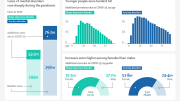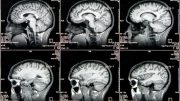
New research has found that people with a history of mental disorders such as depression, bipolar disorder, and anxiety disorders have blood metabolites indicating they are biologically older than their actual age. The discovery may partially explain why these individuals have shorter lifespans and higher rates of age-related diseases, potentially transforming how physical health is monitored and interventions are evaluated for those with mental illnesses.
New research indicates that individuals with prior mental health conditions like depression, bipolar disorder, or anxiety disorders have certain blood indicators that suggest they are biologically older than their chronological age. This could help elucidate why individuals suffering from mental health issues often experience shorter lifespans and a higher incidence of age-related diseases compared to the general populace.
Dr. Julian Mutz and Professor Cathryn Lewis, researchers from King’s College London, conducted an examination of data pertaining to 168 distinct blood metabolites gathered from 110,780 UK Biobank participants. This information was cross-referenced with data regarding participants’ past history of mental illness. The findings revealed that the metabolite profiles of those with a history of mental health conditions were indicative of a greater biological age than their actual chronological age.
Presenting the work at the European Congress of Psychiatry in Paris, lead researcher Dr. Julian Mutz (King’s College London) said:
“It is now possible to predict people’s age from blood metabolites. We found that, on average, those who had a lifetime history of mental illness had a metabolite profile which implied they were older than their actual age. For example, people with bipolar disorder had blood markers indicating that they were around 2 years older than their chronological age.”
People with mental health disorders tend to have shorter lives, and poorer quality health, than the general population. Estimates of the effect vary according to the mental health condition. Often people with poor mental health show an increased tendency to develop conditions such as heart disease and diabetes, and these conditions tend to worsen with age. A 2019 study found that on average people with mental disorders had shorter life expectancy (in comparison to the general population) by around 10 years for men and seven years for women.
Dr. Mutz continued:
“Our findings indicate that the bodies of people with mental health problems tend to be older than would be expected for an individual their age. This may not explain all the differences in health and life expectancy between those with mental health problems and the general population, but it does mean that accelerated biological aging may be an important factor. If we can use these markers to track biological aging, this may change how we monitor the physical health of people with mental illness and how we evaluate the effectiveness of interventions aimed at improving physical health.”
Commenting, Dr Sara Poletti (Istituto Scientifico Universitario Ospedale San Raffaele, Milan) said:
“This is an important work as it gives a possible explanation for the higher prevalence of metabolic and age-related diseases in patients with mental illness. Understanding the mechanisms underlying accelerated biological aging could be crucial for the development of prevention and tailored treatments to address the growing difficulty of an integrated management of these disorders.”
Meeting: 31st European Congress of Psychiatry
Dr. Poletti was not involved in this work, this is an independent comment.
This research is funded by the National Institute for Health and Care Research (NIHR) Maudsley Biomedical Research Centre at South London and Maudsley NHS Foundation Trust and King’s College London. There are no relevant conflicts of interest.









Seeing a connection between mental illness and aging doesn’t necessarily indicate a causal relationship. Maybe it’s only a co-relational thing. Maybe, since humans are so complicated it’s really causal between mental illness and all the drugs given, poor diet, stress, environment (cleanliness and presence of pollutants) or friendship/family/religious support or lack of, all of which corelate with aging. Also notice the mice used are genetically modified to rule out other factors. Can’t do that with people. So why doesn’t the psychiatric community treat the whole person instead of just adding drugs on drugs.